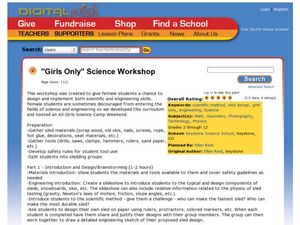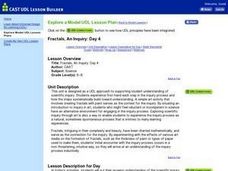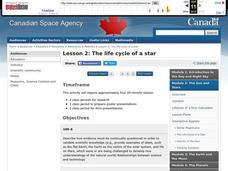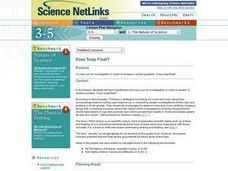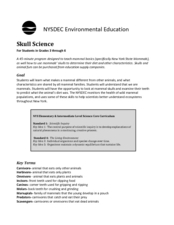Curated OER
"Girls Only" Science Workshop
Students design sleds. In this engineering lesson, students collaborate to engineer and build a real working sleds from the materials provided. This lesson was originally designed to be taught to a group of female students.
Curated OER
Why Cheerios Don't Sink
Students investigate Archimedes' Principle and show how it relates to density. In this Archimedes' Principle lesson plan, students experiment with a beaker of water, a Styrofoam "boat" and a weight. They predict what will happen when the...
Curated OER
Let's Get Warm!
Students investigate various methods that animals use to warm up in cold weather. They also explore the science principals involved. They then identify a human parallel, discuss what we can learn from nature, and create multimedia...
Curated OER
SAFETY KNOWLEDGE BASE CHANGES
Students research and formulate a hypothesis for research to correlate changing safety regulations in regards to personal and environmental safety polices for storage, handling and disposal of chemicals, risk involved in hazardous...
Curated OER
Fractals, An Inquiry: Day 4
Students put their growing understanding of the scientific inquiry process to work. They use paint to implement their plans to experiment with how changing one aspect of the fractal making process influences their appearance.
Curated OER
The Importance of Detailed Procedures in Science
Students examine the importance of clear communication in scientific exploration. In pairs, they write clear directions for an everyday activity for their partner to read and follow.
Curated OER
The Life Cycle of a Star
Students investigate the life cycle of a star and make conclusions based on evidence, research, and observation. In this lesson on space and scientific investigation, students describe the relationships between science and...
Curated OER
Does Soap Float?
Students form hypotheses and carry out an investigation in order to answer a central question: Does soap float? The focus of this lesson is on scientific inquiry, but it incorporates scientific topics such as sinking and floating.
Curated OER
Introducing the Use of Dichotomous Keys to Students
Young scholars are introduced to the use of dichotomous keys as a simple means of beginning scientific observations in nature. They comprehend how to use a dichotomous key. Students distinguish characteristics of a group of organisms....
Curated OER
Introduction To Fractals: an Inquiry
Students evaluate a playful case study about a dog searching for fetching sticks to identify the steps in the science inquiry method. They read the case study and fill in a worksheet with the examples of questions, observations and...
Curated OER
Scientific Revolution
For this scientific revolution study guide worksheet, students respond to 14 short answer questions. The questions correlate to assigned readings in a textbook.
Curated OER
Documenting Science Through an Active Inquiry Process
Students follow procedures regarding scientific data collection. In this scientific inquiry lesson, students investigate inquiry questions through research and data collection. Students use technology tools to create products that...
Curated OER
Comparing the Density of Iron
Young scholars use scientific measuring tools to collect and use scientific data. They determine the density of four different objects by using their data to explain why objects have similar/different densities even though they are both...
Curated OER
Arthropod Data Collection
Students describe the life cycle of various bugs as well as their predators and feeding habits. The class participates in a discussion of the various methods scientists use to gather data including research and experiment. After...
Curated OER
Student Designed Investigations Part 2 – Testable Questions, Predictions, Materials and Procedures
Young scholars create their own investigations. In this science experiments lesson, students use the steps of the scientific method to design an investigation. Young scholars share their findings on a poster.
Curated OER
Cookie Caper
Students determine the best chocolate chip cookie. In this comparison investigation, students create a quantitative scientific study to determine the best chocolate chip cookie using the steps of the scientific method.
Curated OER
People of the Scientific Revolution
In this Scientific Revolution worksheet, students read a brief overview of the contributions of Copernicus, Bacon, Kepler, Galileo, Newton, and Harvey.
Curated OER
Reptiles and Amphibians
Introduce your class to various reptiles and amphibians. They will meet and identify a representative from each of the four major reptile families, then learn about and discuss reptile characteristics. Next, they will identify and...
Curated OER
Skull Science
What can your class learn from a skull? With proper facilitation, they can learn about diet, physical adaptations, special differences, and even the environment. Pupils will examine a series of mammal skulls and pelts to help them...
Curated OER
How to Make a Wind Vane
Learners measure the direction of the wind. In this Science lesson, students make their own wind vane. Learners discuss the importance of wind direction and speed.
Curated OER
How To Make a Science Concept Map
Here is a clever way to get your pupils thinking about a science topic they'd like to research for a report, or a project they'd like to do for a science fair. The three-step process is easy to follow, and it really should help your...
Bonneville
Setting Expectations for Science and Engineering Projects
What is science? Sitting in a whole group discussion, scholars first share their ideas on science and how to conduct investigations. They learn about the steps for scientific inquiry and experimentation. Once finished, individuals then...
Bonneville
Solar Powered Water Pumping
Here's the perfect lesson plan for those who think the world needs faster pumps. Building on the previous activity, scholars work to make the pumps function faster in transferring water between containers. They try adding an additional...
Curated OER
Alas, All Human
Students define a scientist. In this ethics and science instructional activity, students read Asimov's Alas, All Human and write responses and discuss the possibilities of imperfection within science by scientists. Students discuss what...
Other popular searches
- Scientific Method Worksheet
- Scientific Method Activities
- Scientific Method Variables
- The Scientific Method
- Scientific Method Hypothesis
- Six Step Scientific Method
- Scientific Method Lab
- Scientific Method Powerpoint
- Basic Scientific Method
- Scientific Method Botany
- Scientific Method Lab Report
- Scientific Method Vocabulary
